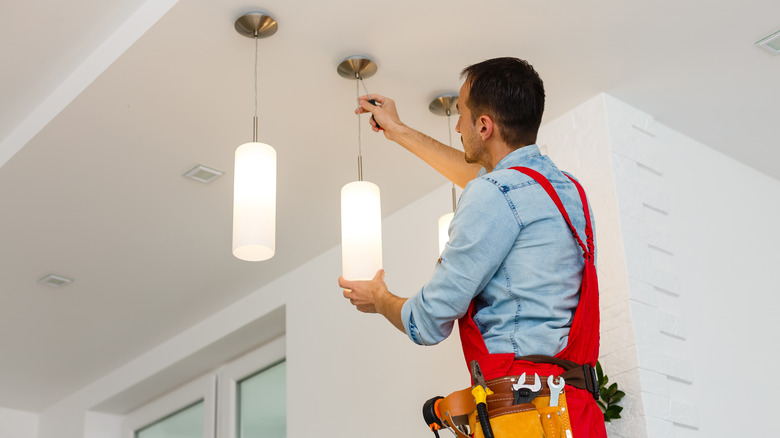Mistakes Everyone Makes When Hiring Contractors
Sometimes when we do remodeling projects around the house, they don't turn out to be as DIY friendly as we originally thought. In this situation, it's better to bring in professional help. But what's the best way to go about it? According to The Washington Post, knowing when to step back and invite in a contractor can be tricky.
However, the best way forward is to consider the project's entire timeline from start to finish. Think about your abilities and critically examine your limits. Perhaps you feel comfortable with demo day and a little bit of carpentry, but don't trust yourself to do the work of an electrician. Or maybe it's the other way around. And anytime something could be hazardous to your health (like dealing with mold, septic systems, etc.), it would be best to hand it over to a professional. However, once you've made these considerations, there is still a high probability that you could get scammed or receive shoddy work. To ensure this doesn't happen to you, you'll need to avoid these common mistakes when hiring contractors.
Only hiring one contractor
According to Angi, depending on the scope of the renovation project you have on hand, it's likely you will need more than one tradesman to complete your project to your standards. While many general contractors have a team of specialists working under them, you might also want to consider handpicking your plumber, electrician, and arborist separately from your general contractor to ensure the quality of their work is what you prefer.
Suppose you only hire a general contractor and let his team come in without seeing individual samples of everyone's work. In that case, there is a high probability that you might not like the work once it's done, or there could be problems with working styles along the way. For more personalized work, like carpentry for built-ins, you might prefer the handiwork of your own contractor over that of someone else's teammate. To avoid any trouble, asking questions about your general contractor's team, industry connections, and general recommendations is essential during the hiring process.
Forgetting to have back ups in mind
Sometimes your first choice of contractor might not work out. This could be due to a lack of funding on your end, a busy schedule for the contractor or even disagreements over the scope and quality of work to be done. To save yourself in a pinch, you should already have a second option in mind.
According to Due, even general contractors have multiple backups for each kind of work on their team. They do this to stay on schedule during an emergency and ensure the client's work is done on time. Backups are also great to have around to reduce the workload in general for the main contractor, and make sure that everyone on the team has more options and flexibility for the project at hand. The same principles apply to clients, too. Having more than one contractor in mind for different parts of the projects (and even backups for those, too) gives you plenty of breathing room to make sure everything is finished on time and up to snuff.
Choosing not to run a background check
When you have someone working in and around your home, it's important to know exactly who they are. According to Barefoot Professional Investigations, a typical background check into a general contractor tells you about certain key aspects of their past. You will learn about their certifications and employment history to make sure they really are good at what they do. You'll also get a report of their criminal record (if any), a description of any workplace misconduct that's occurred, as well as any causes of fraud or workers comp filed against them.
These background checks keep contractors honest, and they also protect you as the consumer because you will have no doubt about the character, history, and abilities of the person or team you've hired to work within your home. According to Iprospectcheck, running background investigations on independent contractors is the norm for hiring freelancers. Because of this, most general and independent contractors who do construction and renovation work around your home should also be willing to submit to a background check. Please note, however, that this typically doesn't apply if you have an employee from a local company come out for one-time services, like a plumber fixing a leak. That's because their employer would have covered this step for you.
Hiring a friend because it's cheaper
According to Suburban Construction, hiring a friend or family member to assist in large renovation projects in and around your home (or a property you're flipping) likely isn't a good idea. This is because undertaking a large financial venture with family or friends can strain the relationship. When you pay a family member a lot of money to do a project for you, if you are not pleased with the results, there is a possibility that the fracture in the relationship caused by this event will not be easy to heal. For example, if you hire your cousin to paint your house and the coat is blotchy and uneven, will you still want him in your home surrounded by his handiwork for Thanksgiving dinner?
It's also possible in these situations that your loved one might not have the proper licensing and insurance that's needed for the job, which can leave you in a real pickle. Realtor recommends that the best way to go forward in all of this is to take a step back and think through your family member's abilities. Do they own a construction company, or do they just enjoy woodworking? Are they a licensed plumber, or just good at DIY? From there, you can assess the risks and make the choice that's best for both your wallet and your sanity.
Accepting the first quote you get
According to Finance of America Home Improvement, you should always shop around for the best quote for each project to avoid being taken advantage of during your project. When selecting your contractor, write as detailed a list of your anticipated needs as possible. This way, each contractor can give you the most accurate quote possible, and you'll be left with fewer surprises down the road.
When soliciting bids from different contractors, it's always a good idea to gather at least three different quotes. This way, you can begin to get a better picture of the average price for a service. If the bids are vastly different, one contractor is likely an outlier, but if they are generally in the same range, then you're getting a more fair market deal. Remember, however, that cheaper doesn't always mean better. If one company has a price that is way lower than all competitors, consider what sort of cost-cutting measures might make this possible for them to do.
Paying cash for a project
Paying cash for a project on your home is a great way to lose your money in case of a dispute. According to Forbes, pricing will vary from contractor to contractor. This is normal, and you should expect this; however, what's not normal is paying with cash. Even if they offer you a cash price discount, consider whether or not having no paper trail is beneficial for you, just in case anything goes wrong.
Before you sign a contract and before work can officially begin, be sure to speak with your contractor about all payment options. You can pay via check or credit card for smaller projects like a single room renovation, or general repairs like getting your roof redone. If you are renovating an entire house or the project is more than your credit limit, you can even arrange financing options with most bona fide contractors. In this case, you might make monthly payments or lump sum payments when certain construction checkpoints are reached. Remember, if a contractor only takes cash, it's probably a scam, so be extra careful.
Not setting up project boundaries
Before any work begins on your home, there are firm boundaries you need to discuss with each of your contractors and their team. According to Ken Spears Construction, this would be things like restricting access to certain areas of your home. For example, if you are remodeling your kitchen, you might prohibit workers from traveling to the house's upper floors. Depending on the length of the project, you might set up portable toilets outside for privacy for your contractors, rather than them using the ones inside your home. These are all personal boundaries, so you can choose what you are comfortable with and set the rules accordingly.
In addition to accessible areas of the home, you also need to speak to your hired team about any firm financial boundaries. We know that things can come up during the construction process, but establishing a relationship of trust with your contractor ensures they communicate all significant changes or problems with you before they take action. This will ensure you can afford it and stay abreast of what's happening inside your home.
Forgetting to check their portfolio
A mistake that too many homeowners make when hiring contractors is forgetting to investigate their potential hire's portfolio. According to The National Association of the Remodeling Industry, looking into past clients and projects is essential. You should be asking questions like: Have past clients been happy with this contractor's work? Are they willing to provide references? Or, in place of that, does the contractor have testimonials from previous projects readily available, perhaps on a website or via a pamphlet?
In your research, consider if there have been any major complaints made against them. If they have a large enough business, there will likely be at least some negative reviews online. This is the cost of doing business, so it's inevitable. Some might be warranted, but others could be from disgruntled former clients. So, also hearing the contractor's side of the story is important, so you can form a plan to avoid the previously negative experience.
Choosing not to make a plan for setbacks
If we've learned anything from watching hours of our favorite HGTV shows, it's that anything that can go wrong during construction, will go wrong. Because of this, you need to plan ahead and speak to your contractor about how you would like to handle these situations before they happen.
According to Först Consulting Group, a plan like this is important because a contractor needs to know what choices they can make without consulting you and what choices you need to have a say in. Through the course of the job, the contractor and his team might attempt to solve problems before you know about them, or go the extra mile to bring your vision to life. And, at the end of the day, even if you like the work done or appreciate that the problem was solved ahead of time, it's important that contractors know exactly how you prefer things handled well in advance.
Forgetting to discuss insurance ahead of time
You'll need to make sure your contractor is insured before they start work on your home, just in case. According to Harris Insurance, a legitimate contractor should have many different types of insurance to keep things above board. They need to be insured against injury on the job site, as well as damage to your home. However, in some cases, your own homeowner's insurance policy might also have a clause about damage caused during a renovation.
In either case, before construction begins, speak to your contractor about getting a copy of their insurance details. You'll want to know the policy name, number, and the amount they are covered for. The maximum policy benefits should be at least the state-required minimum, but hopefully more. Then, speak to your own homeowner's insurance provider about what you are covered for. If coverage does not feel sufficient, you have the option to take out extra coverage as long as no damage has occurred yet. If you wait until after, then it's insurance fraud.
Not creating a written contract
Any sort of home renovation is a business deal, so get a written contract to protect yourself. This can be tough, as plenty of contractors operate on a more old-school gentlemen's agreement type of contract. According to This Old House, avoiding this for an extensive paper contract doesn't mean you are suspicious or don't trust your contractor. It just means you are trying to protect all parties. The contract should include the terms of payment (how much, when, in what way), all insurance information, as well as a projected timeline.
The team at TexasLawHelp adds that any change orders (seen and unforeseen) should be provided for, any permits needed to be mentioned, as well as the more minor details, like in what state the contractor and his team will leave the construction site. That is, will they sweep up all the dust, haul away all the trash, etc. Writing down each detail will save each party a lot of strife.
Throwing away paperwork after the project
According to Nolo, keeping all your paperwork from any projects you've done on your home will come in handy come tax time. This is because if your improvements have significantly increased your home's value and you plan to sell the property at any point, then your overall tax responsibilities might be less. This means that, unless you are 100% sure that you will never sell your home, it's best to file all paperwork in a safe spot to keep indefinitely. Be sure to speak to a certified tax professional to get the best information about your unique situation, but you'll need to keep the papers on hand to get the most accurate quote.
According to Angi, keeping paperwork on hand in the longer term can also help protect you should any problems arise with the work. Suppose you have the contractor's information, your contract, the scope of the project, and their insurance information. In that case, it will make the process of setting everything right should the paint start peeling or the built-ins cave in so much easier for everyone involved.
Letting a contractor rush you through the hiring process
When hiring a contractor to perform work on your home, you should always have time to complete your due diligence. According to News Tribune, if you are experiencing pressure or harassment to move forward when you are not ready, cross them off your list. Think about it this way: if you were hiring a candidate to work as a cashier, a teacher, or even an engineer, it would not be appropriate for the candidate to try to talk you out of checking their references, running a background check, and examining their portfolio of work. These are all acceptable parts of a hiring process, and you should feel confident completing them to your satisfaction.
If a contractor attempts to rush you through the process, there is likely something suspicious occurring behind the scenes. If you cannot efficiently partner with your contractor throughout the hiring process, it's unlikely that the work they do on your home will be much better.
Choosing a contractor that solicits you
Be wary of door-to-door contractors, especially after a natural disaster, as there might be extreme price gouging. According to KHOU 11, after the severe winter ice storm of 2021, many Texans experienced price gouging. There were nearly 2,000 complaints of price gouging filed with the Texas Attorney General's Office, including protests over plumbers charging nearly $700 to come and take a look at a split pipe, not even fix it, as the demand for services was so high.
In any natural disaster situation, whether a wildfire, ice storm, or hurricane, the demand for contract work will be high, which is the perfect opportunity for scammers to thrive. The Texas Young Lawyers Association recommends that homeowners can protect themselves by not signing over any insurance reimbursements directly to the contractor in these situations. Be sure to check references, even in times of disaster, and never agree to anything verbally. Instead, always get it in writing.














